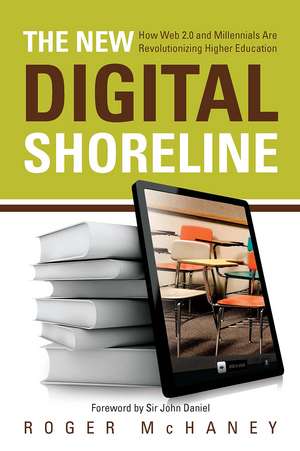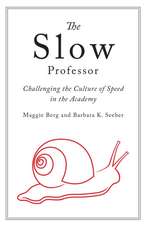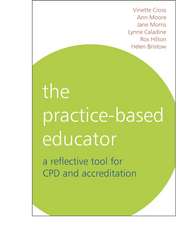The New Digital Shoreline: How Web 2.0 and Millennials Are Revolutionizing Higher Education
Autor Roger McHaneyen Limba Engleză Paperback – 13 apr 2011
| Toate formatele și edițiile | Preț | Express |
|---|---|---|
| Paperback (1) | 306.04 lei 6-8 săpt. | |
| Taylor & Francis – 13 apr 2011 | 306.04 lei 6-8 săpt. | |
| Hardback (1) | 1002.32 lei 6-8 săpt. | |
| Taylor & Francis – 20 apr 2011 | 1002.32 lei 6-8 săpt. |
Preț: 306.04 lei
Nou
Puncte Express: 459
Preț estimativ în valută:
58.57€ • 60.92$ • 48.35£
58.57€ • 60.92$ • 48.35£
Carte tipărită la comandă
Livrare economică 15-29 aprilie
Preluare comenzi: 021 569.72.76
Specificații
ISBN-13: 9781579224608
ISBN-10: 1579224601
Pagini: 267
Dimensiuni: 152 x 229 x 15 mm
Greutate: 0.37 kg
Ediția:1
Editura: Taylor & Francis
Colecția Routledge
Locul publicării:Oxford, United Kingdom
ISBN-10: 1579224601
Pagini: 267
Dimensiuni: 152 x 229 x 15 mm
Greutate: 0.37 kg
Ediția:1
Editura: Taylor & Francis
Colecția Routledge
Locul publicării:Oxford, United Kingdom
Public țintă
PostgraduateCuprins
Foreword—Sir John Daniel Preface 1. Discovering a New Shoreline * Obsessions * Educational Tipping Point * Our Zahir * The Law of the Few * The Stickiness Factor * The Power of Context * Briefly, a Long Tale * Musing on Our Zahir 2. Indigenous Populations on the Shoreline * New Population * Who was that Guy (or Gal)? Shape Shifters * What, Me Wait? Time Shifters * Persistent and Accessible. Piracy and Storage * Are You Paying [for] Attention? * Not Now, I’m Busy Vs. Of Course Now, I’m Busy. Timeslicing * Thinking in Circles? Nonlinear Thinkers * Are We There Yet? Mobility and the Tech-Savvy Millennial * If I Can’t Find It, I’ll Make It. Creators * Honor Among Thieves or High Tech Con Artists? * Higher Education’s Opportunity With Tech-Savvy Millennials 3. The New Shoreline’s Topography. Platforms for Learning * Technological Change and the Future * Overview of Platforms * Interaction Devices * Content Development Tools for Students * Video Game Consoles and Devices * Mobile Devices * Virtual Learning Environments * Summary 4. The New Shoreline’s Topography. Web 2.0 and Social Learning * Web 2.0 Overview * Social Computing * Social Media * Summary 5. The New Shoreline’s Topography. Web 2.0 Content, Filtering, Apps, and Emergent Behaviors * Content Sharing * Filtering and Recommendations * Web Applications (Apps. * Emergent Behaviors on the Web * Summary 6. What Students are Finding on the New Shore * Student Expectations of Higher Education * The Reality of New Media * Class Delivery on the New Shoreline * Summary 7. Convergence on the New Shoreline * Metaphorical Visit to Randolph, Kansas * Pedagogy * Pedagogy Vs. Learning Theory * Fallacies of Learning Theories * Learning and the Tech-Savvy Millennial * Technologies and Learning Theory * The Connectivist Classroom * Summary 8. Taking the Next Step * Moving Forward in Changing Times. Settling the New Shoreline * Coping as a Teacher * Students’ Roles on the New Shoreline * The Long Tail Revisited * Finding the Next Big Thing in Education * Conclusion References Appendix. Absolutes for Teaching Excellence Index
Notă biografică
Roger McHaney is a University Distinguished Teaching Scholar and professor of management information systems in Kansas State University's College of Business Administration. He currently serves as the Daniel D. Burke Chair for Exceptional Faculty. A K-State faculty member since 1995, McHaney teaches courses in enterprise systems and computing. His research areas include simulation, education technology, virtual worlds, and organizational computing. McHaney holds a doctorate in computer information systems and quantitative analysis from the University of Arkansas. He has lectured in many countries including New Zealand, Australia, China, UK, India, Greece and Italy. McHaney has published in numerous journals, written textbooks, and developed an array of instructional materials including ELATEwiki.org. He is currently working on several projects that investigate how technology and Web 2.0 impact higher education. Sir John Daniel is President, The Commonwealth of Learning, and formerly Assistant Director-General for Education, UNESCO, and Vice-Chancellor of The Open University.
Recenzii
“A masterly and authoritative presentation of the topography of the new digital shoreline that will be invaluable to his fellow faculty.
Roger McHaney’s concern in this book is primarily for the future of the public universities that constitute the bedrock of US higher education. He has provided us with a lively yet scholarly guide to the changes that these institutions must make if they are to attract today’s tech-savvy millennials to their campuses and offer them engaging programs. There is no time to waste. As he recalls, we tend to overestimate the importance of new trends in the short term while underestimating their longer-term impact. It is already later than we think."
Sir John Daniel, President, Commonwealth of Learning, and former Vice-Chancellor of The Open University
"Explores such topics as social media and learning, engaging the "tech savvy millennial" in the classroom, and the impact of e-readerse and tablet computers on the future of the textbook."
The Chronicle of Higher Education
"The New Digital Shoreline: How Web 2.0 and Millennials Are Revolutionizing Higher Education offers a fine survey of the complex effects of Web 2.0 on higher education, documenting forces that educators need to know about to modify interactions with students and peers. From understanding how the population of the new Web is different with different expectations to understanding the new mind-set of Web 2.0, this is packed with details supporting a reinvention of higher education to meet these new perspectives - a support which goes beyond just adding new technology to the learning mix. Higher education collections must have this new approach!"
Midwest Book Review
"The New Digital Shoreline is a fascinating overview of where education is heading. Parents, teachers, and everyone else involved in learning would be well-advised to read this book."
The Futurist
"This book is phenomenal. I mean, easy read, fantastic structure and meaningful reflections."
ESL Adaptation Readings Blog
"This book is written in a very direct, conversational style that is easy to read and explains why we need to rethink how we approach teaching and learning in the light of technology and learner change and how we might do that... This is an excellent book for those of you who have just arrived at the shoreline and are peering out at the horizon with trepidation. It should be given to colleagues who need to be persuaded to join those of you paddling out there and can be used when considering curriculum review or assessment alternatives."
Educational Developers Caucus Resource Review (EDCResourceReview)
"Regardless of whether higher education institutions want to face it or not, the wave of millennials is arriving at their footstep with backgrounds and needs very different compared to any other generation that have entered college. McHaney helps academic advisors navigate their way towards finding the best ways to reach and support this new student population. Readers do not need to have a high level of knowledge about Web 2.0 and its history. The author explains these aspects in the beginning sections of The New Digital Shoreline in a manner that is straightforward and easy to understand. Once a solid understanding about the latest advances in technology has been established, McHaney then describes how these evolutions have shaped the expectations and actions of millennial students... Academic advisors who are lost as to where to begin to incorporate technology into their offices will find The New Digital Shoreline valuable."
NACADA (National Academic Advising Association) Journal
"The book offers brief, insightful analyses of several features of the new digital shoreline: ways that digital technology and social media are changing the character of higher education teaching; key characteristics of today's students (digital natives); a catalogue of devices, platforms, programs, and applications with relevance for teaching; ways that digital natives learn; and guidelines for next steps to take on the way toward basic proficiency in teaching for the digital age. McHaney's book can serve as a useful guide to digital immigrant faculty who seek to obtain a green card in the digital age. It might also prove useful for doctoral students preparing for a career teaching in higher education."
Gordon S. Mikoski, Princeton Theological Seminary
Teaching Theology & Religion
"The New Digital Shoreline’s exploration of millennial learners and the evolution of educational technology and pedagogy is relevant for both face-to-face and online educators. McHaney believes higher education’s “long statistical tail” may increase the market for distance learning, especially offerings by reputable universities and professors, leading to increased competition based on niche factors and costs. McHaney states, 'It is almost certain that, in decades to come, our linear educational systems will be replaced with nonhierarchical structures marked by self-directed, individualized, and customized learning experiences that draw on multiple resources'. Key insights for educators can be found in the author’s examination of the inextricable co-evolution of society and education. McHaney succeeds in grounding each conversation with practical advice on how faculty can adapt to technologies, instructional strategies, and students found on the new digital shoreline of higher education."
Open Praxis, the journal of the International Council for Open and Distance Education
Roger McHaney’s concern in this book is primarily for the future of the public universities that constitute the bedrock of US higher education. He has provided us with a lively yet scholarly guide to the changes that these institutions must make if they are to attract today’s tech-savvy millennials to their campuses and offer them engaging programs. There is no time to waste. As he recalls, we tend to overestimate the importance of new trends in the short term while underestimating their longer-term impact. It is already later than we think."
Sir John Daniel, President, Commonwealth of Learning, and former Vice-Chancellor of The Open University
"Explores such topics as social media and learning, engaging the "tech savvy millennial" in the classroom, and the impact of e-readerse and tablet computers on the future of the textbook."
The Chronicle of Higher Education
"The New Digital Shoreline: How Web 2.0 and Millennials Are Revolutionizing Higher Education offers a fine survey of the complex effects of Web 2.0 on higher education, documenting forces that educators need to know about to modify interactions with students and peers. From understanding how the population of the new Web is different with different expectations to understanding the new mind-set of Web 2.0, this is packed with details supporting a reinvention of higher education to meet these new perspectives - a support which goes beyond just adding new technology to the learning mix. Higher education collections must have this new approach!"
Midwest Book Review
"The New Digital Shoreline is a fascinating overview of where education is heading. Parents, teachers, and everyone else involved in learning would be well-advised to read this book."
The Futurist
"This book is phenomenal. I mean, easy read, fantastic structure and meaningful reflections."
ESL Adaptation Readings Blog
"This book is written in a very direct, conversational style that is easy to read and explains why we need to rethink how we approach teaching and learning in the light of technology and learner change and how we might do that... This is an excellent book for those of you who have just arrived at the shoreline and are peering out at the horizon with trepidation. It should be given to colleagues who need to be persuaded to join those of you paddling out there and can be used when considering curriculum review or assessment alternatives."
Educational Developers Caucus Resource Review (EDCResourceReview)
"Regardless of whether higher education institutions want to face it or not, the wave of millennials is arriving at their footstep with backgrounds and needs very different compared to any other generation that have entered college. McHaney helps academic advisors navigate their way towards finding the best ways to reach and support this new student population. Readers do not need to have a high level of knowledge about Web 2.0 and its history. The author explains these aspects in the beginning sections of The New Digital Shoreline in a manner that is straightforward and easy to understand. Once a solid understanding about the latest advances in technology has been established, McHaney then describes how these evolutions have shaped the expectations and actions of millennial students... Academic advisors who are lost as to where to begin to incorporate technology into their offices will find The New Digital Shoreline valuable."
NACADA (National Academic Advising Association) Journal
"The book offers brief, insightful analyses of several features of the new digital shoreline: ways that digital technology and social media are changing the character of higher education teaching; key characteristics of today's students (digital natives); a catalogue of devices, platforms, programs, and applications with relevance for teaching; ways that digital natives learn; and guidelines for next steps to take on the way toward basic proficiency in teaching for the digital age. McHaney's book can serve as a useful guide to digital immigrant faculty who seek to obtain a green card in the digital age. It might also prove useful for doctoral students preparing for a career teaching in higher education."
Gordon S. Mikoski, Princeton Theological Seminary
Teaching Theology & Religion
"The New Digital Shoreline’s exploration of millennial learners and the evolution of educational technology and pedagogy is relevant for both face-to-face and online educators. McHaney believes higher education’s “long statistical tail” may increase the market for distance learning, especially offerings by reputable universities and professors, leading to increased competition based on niche factors and costs. McHaney states, 'It is almost certain that, in decades to come, our linear educational systems will be replaced with nonhierarchical structures marked by self-directed, individualized, and customized learning experiences that draw on multiple resources'. Key insights for educators can be found in the author’s examination of the inextricable co-evolution of society and education. McHaney succeeds in grounding each conversation with practical advice on how faculty can adapt to technologies, instructional strategies, and students found on the new digital shoreline of higher education."
Open Praxis, the journal of the International Council for Open and Distance Education
Descriere
This book argues for nothing less than a reinvention of higher education to meet these new realities. Just adding technology to our teaching practices will not suffice. McHaney calls for a complete rethinking of our practice of teaching to meet the needs of this emerging world and envisioning ourselves as connected.













